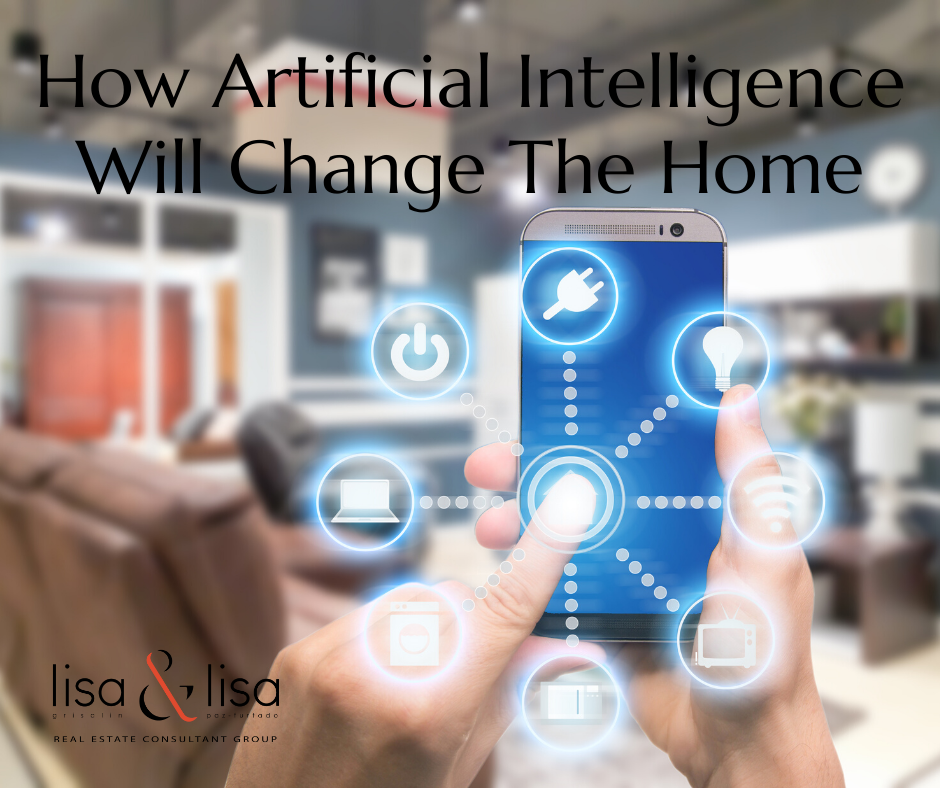
With Smart Home technology taking off and smart home assistants (like Amazon Alexa, Google Home and Apple Siri) becoming more prevalent in homes the start of a new home technology revolution is underway. Homeowners can monitor and control the house heating and cooling systems, security systems, door locks, garage doors and more all from where ever they have access to internet on their smartphone. Artificial intelligence (AI) will add to that ability by allowing decisions about the home to be made without the need of direct input from the homeowner. For instance a trusted dog walker walks up to the front door during their scheduled time to take Fido out for a walk. The dog walker’s face is seen via camera which an artificial intelligence assistant recognizes and knows they are there during the correct time and allows the door to be unlocked so Fido can enjoy some outdoor time while the homeowner is away. This article explores both the positive and negative impacts of artificial intelligence for the homeowner.
WHAT IS ARTIFICIAL INTELLIGENCE?
Intelligence is defined “…as the ability to perceive or infer information, and to retain it as knowledge to be applied towards adaptive behaviors within an environment or context.” Basically put it means using learned information in and around us to make choices. With regards to human behavior we make choices every day based on what we know. We decide to wake up early on work days because we know we need to go to work to earn a paycheck to live. On weekends or other days where we don’t work we know we do not need to wake up very early as we do on a workday and hence may sleep in. Decisions are made based on conditions and choices. The artificial aspect comes into play in that we are giving a non-living thing like a machine the ability to learn, decide and make choices. Most of the choices made are simple choices such as when to turn the heat on or off or when to open the door (some trusted relatives may be okay to open a door for when no one is home but for any other random person we would not want the door opened).
In the example of getting up to go to work there is always the option of not going to work. Whether we call in sick, take a day off or just plain skip work humans know the variables that are involved with making that choice. Those variables need to be programmed into a machine in order to give them the intelligence they need to make a decision. Current versions of consumer available artificial intelligence systems are limited mainly due to being so new and trying not to do too many things at once.
Most of the current smart home assistants like Alexa must be connected to the internet so inquiries made to it can be cross referenced with an extensive list of similar inquiries in order to provide a correct answer. These smart home assistants do not necessarily approach the level of being a true artificial intelligence and instead are advanced cloud (internet based) computers that use voice input to interface with the computer. Obviously artificial intelligence is much more advanced than described above and beyond the scope of this article. For more in depth reading about artificial intelligence be sure to check out the additional resources below.
ARTIFICIAL INTELLIGENCE AND THE HOME

Certainly with the pairing of many smart devices homes can have many AI like features. Smart thermostats can automatically turn down when the homeowner leaves the house with their smart phone. When the owner returns to the house the smart thermostat can warm up the house or cool down the house based on the season as the homeowner gets closer to the house. So there is somewhat intelligent operation of the heating and cooling system. But what if you have more than one homeowner and each has their own preference in terms of how cool or warm they prefer it? An artificial intelligence could know based on who is coming home whether the house needs to be warmer or cooler based on preference of a particular individual. When both or more residents of the home are at home the AI can adjust the temperature to try and make everyone feel comfortable. The end result is a more energy efficient home that is comfortable when people are in the home based on the AIs choosing.
Another example of artificial intelligence in the home could be robotic vacuums. Most robotic vacuums operate on a fixed schedule set by the homeowner regardless of how clean or dirty the home is. On a day after a dinner party a longer vacuuming cycle may be needed or during the warmer months when the windows are more likely to be open the extra dust or pollen may need more time to be cleaned up. Current robot vacuums won’t be able to adjust cleaning time or cleaning location absent user input, with a whole home AI the AI can have the vacuum operate more in a particular area or operate for longer woman on computer overall.
One of the key aspects needed for an AI to operate in a home are sensors. Just as humans have their five senses an AI will need sensors (senses) to keep an eye on things in the home. Visual senses through a camera can allow for security as well as monitoring the condition of the house (more cleaning, less cleaning, obstacle avoidance etc.). Audio sensors are also helpful for security and other purposes. Being technology based AI systems have many more sensors that can be used in the home to learn more about the home’s environment such as air quality sensors, water quality sensor, and the need of light based sensors. Certain systems that operate within the house like a robot vacuum or the HVAC system can share their sensor data with an AI system in order to allow it to make better decisions. The AI then becomes a whole house computer tying together all aspects of the home to make home life better for it’s occupants.
PRIVACY AND SECURITY CONCERNS WITH ARTIFICIAL INTELLIGENCE IN THE HOME

Just as with anything technology related there comes with it the aspect of some abusing the technology in order to further their own gains. As we have seen with recent news about certain social media giants the use of information we share on social media to sell to us or to sway our political beliefs can be unsettling since these companies go beyond just looking at what we write on the platform and instead aggregate information from multiple sources. Credit reporting agencies and other data collection companies are more than happy to sell what they know about us individually to the highest bidder. The same will be true of any AI system that monitors our house for our benefit, it becomes a point of data collection about our everyday lives.
Smart phones can track where we are at, how long we are there, and can even sometimes tell who else was with us at the time based on the constant on internet connections. Similar are the smart home assistants (Alexa, Siri, etc.) which also require an always on internet connection so the device can talkman eavesdropping with the central server in order to get an answer to the question or request posed to it. One of the main reasons for the always on internet connection for the smart home assistant is so the devices can become smarter and answer faster. People will generally ask the same question as others. From what is the weather going to be like today, or what actors played Batman during the 1990s? By collecting all the types of questions being asked, better answers can be tailored and be available faster for those asking. After all with technology people want the convenience as well. They don’t want to wait for an answer but want the answer right now.
Home based AI systems will likely require an always on internet connection in order for it to provide all the services and decision making that will be required of it. Do you want the floor plan of your house to be shared with any and every marketer that was uploaded from a map made by your robotic vacuum? Anytime you move furniture or add a new piece of furniture you could find yourself being targeted by advertisers offering furniture cleaning or carpet services. Having air quality monitored by a central house AI could mean once the quality data is shared you will then get advertisements for HVAC cleaning services or air filter manufacturers. Some are not comfortable with that level of knowledge that will be put into the hands of marketers all in the aim of selling something.
Another concern with having a fully connected home with an AI controlling many of the systems of the home is hackers taking over. Without adequate security for the systems, hackers can easily gain control and demand money in return for turning control back over to the homeowner. If the homeowner refuses to pay the hackers can run the HVAC system until it burns out or unlock all doors when no one is around and allow their local person to take what they want. Without good solid security protocols the AI home of the future can quickly turn into a nightmare.
BOTTOM LINE
The AI home of the future can automate many features of the home and make home life much more comfortable for the occupants. At the same time security and privacy risks may dampen the desire for the technology. Time will tell if homeowners are willing to bring in advanced AI systems to run their home for convenience sake and what privacy/security tradeoffs there might be.
Courtesy of Cincinnati & Northern Kentucky Real Estate


